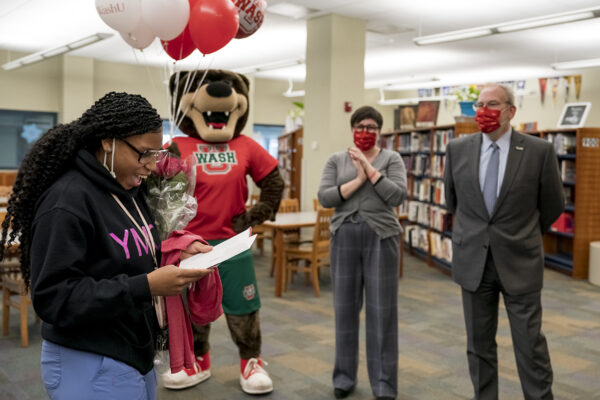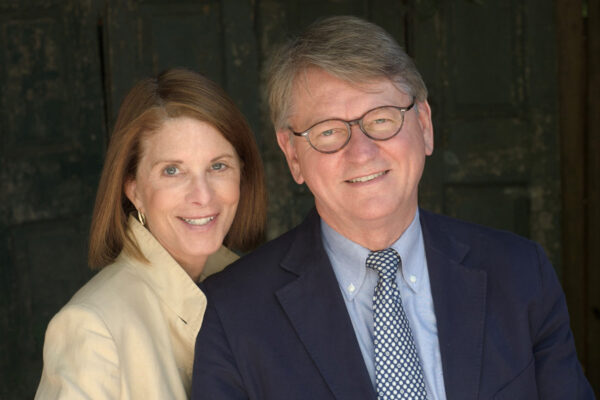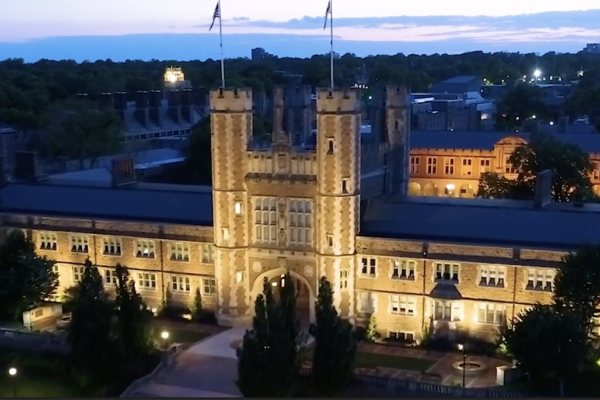Andrew Taylor, a Washington University in St. Louis emeritus trustee, and his wife, Barbara, have made a $15 million gift to establish the Taylor Family Center for Student Success.
The Taylor Family Center will create new opportunities for first-generation and limited-income undergraduate students to connect with mentors, strengthen social and professional networks, explore purpose-driven internships and develop financial literacy.
Chancellor Andrew D. Martin said the gift, the latest of many from the Taylor family, advances a key priority of Make Way: Our Student Initiative — to provide the best-in-class experience for all students regardless of their backgrounds.
“The Taylor Family Center for Student Success will set a new standard for American universities,” Martin said. “This $15 million philanthropic investment will integrate academic success, leadership opportunities and career development to transform the lives of students.”
The Taylor Family Center will build on the success of an array of programs and initiatives that connect first-generation and limited-income students to campus resources and a community of their peers. Recent examples include first-year grants for computers and move-in essentials; the Chancellor’s Career Fellows program, which offers career education and a $5,000 internship stipend; and the Stephanie Brooks Dains and John Dains Student Success Fund, which covers emergency and educational enrichment expenses.
But the Taylor Family Center also will deliver something more — access to social capital, a key driver of economic mobility.
“Old models for investing in student success, including ours, were based on the premise that pairing students with mentors who have had similar life experiences would garner the best outcomes. And the strong sense of belonging among our students proves there is value in that,” said Anna Gonzalez, vice chancellor for student affairs. “But relying solely on this approach limits outcomes and reinforces the personal and societal divisions we want to break down at WashU.”
Approximately 1,600 Washington University undergraduates are either limited-income, first-generation or both — and that number is growing thanks to the university’s new need-blind approach to admissions and expanded scholarship support. Mark Kamimura-Jimenez, associate vice chancellor and dean of the Center for Diversity and Inclusion, said the Taylor Family Center will provide a structured four-year experience that starts with a first-year early arrival program and continues with a robust mentorship initiative that will connect participants with fellow students, faculty and staff and St. Louis leaders.
“Our students will have a mentoring team for life,” Kamimura-Jimenez said. “They’ll have peers who will help them get their footing. They’ll have older students saying, ‘This is what’s coming and this is how to prepare.’ And then they will have people who have been down the path who can help them define and achieve their goals. We know from research that this sort of mentorship, which crosses class and demographic boundaries, can have a long-lasting and transformative impact.”
The Taylor Family Center also will support families through its Forward Families Program, which will introduce families to campus life, provide an orientation and offer parent mentors to serve as a resource.
Gonzalez said the entire WashU community can play a role in the success of the Taylor Family Center, whether it’s the First Generation Investors chapter demystifying the stock market or a graduating pre-med student sharing test prep strategies for the Medical College Admission Test.
“Students without financial need will be invited to be a part of their classmates’ experiences,” Gonzalez said. “We have a tendency to be siloed — this community here, that community there. The Taylor Family Center will break that down a little bit in a way that builds a stronger WashU community.”
The $15 million gift to establish the Taylor Family Center continues a long legacy of support from the Taylor family. Among their contributions, Andrew and Barbara Taylor and the Crawford Taylor Foundation provided $30 million to advance the diagnosis and treatment of psychiatric illnesses through the Taylor Family Institute for Innovative Psychiatric Research at Washington University School of Medicine.
The Taylor family and Enterprise Holdings, the St. Louis-based company founded by Andrew Taylor’s father, the late Jack Taylor, contributed $70 million to establish and expand the Enterprise Holdings Scholars program, which provides tuition support to students with financial need. The program has benefited more than 400 students since 2001.
Andrew Taylor, executive chairman of Enterprise Holdings, feels a special pride for the program. Over the years, he has received letters from many of the program’s scholarship recipients. He reads every one.
“I am so interested in the different places they come from, the different backgrounds, the different opportunities they have had or not had,” Taylor said. “These are really special kids. Maybe they come from a one-parent family with a mother who is working hard to support her children. Maybe they are the first person in their family to go to college. But they’ve got the brains to get to WashU and the ambition. Really, it’s inspiring.
“And now the Taylor Family Center will help many more students like these move forward, go do great things and maybe stay in St. Louis and make St. Louis better.”
Taylor is a longtime leader at the university. He joined the Board of Trustees in 1994 and became an emeritus trustee in 2021. As chair of the public phase of Leading Together: The Campaign for Washington University, which concluded in 2018, he helped raise a record $3.378 billion to support the university’s mission of teaching, research, patient care and service. In 2018, he and Barbara received the university’s Robert S. Brookings Award. They were awarded honorary degrees during the university’s Commencement ceremony in 2022.



